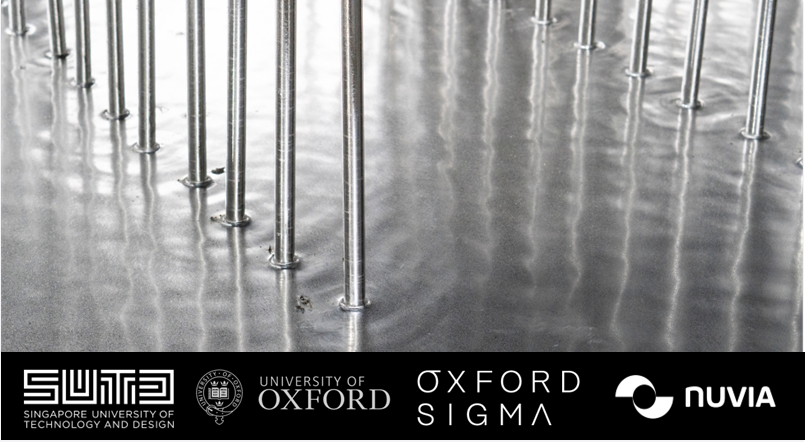Oxford Sigma is leading a partnership with the University of Oxford, NUVIA, and the Singapore University of Technology and Design (SUTD) to solve key materials challenges of liquid lithium breeder blanket designs for fusion energy as part of the United Kingdom Atomic Energy Authority’s (UKAEA) Small Business Research Initiative (SBRI): Fusion Industry Challenges: phase one. Nuclear fusion reactors require tritium to be continuously bred online in order to offset the quantity of tritium consumed during operation. These devices, called breeder blankets, surround the fusion reactor core and experience extreme radiation damage, high operational temperatures, large magnetic fields, corrosive environments due to the presence of liquid metal coolants, and tritium permeation through the walls. Neutron activation of lithium-6 is used to generate tritium, which is the hydrogen isotope used as fuel for a fusion reactor. These blankets are key to enabling fusion energy as a source of electricity; if these devices cannot be constructed and operated reliably with sufficient performance, then fusion energy will not be commercially successful.
A key unsolved challenge in liquid lithium-based breeder blankets designs is the development of materials that can resist the extremely corrosive nature of liquid lithium at operational temperatures. Since the 1960s, there is insufficient literature data on lithium corrosion with compatible fusion materials. Identifying suitable materials is one of the key challenges to demonstrate the technical feasibility of liquid lithium-based breeder blankets. Therefore, it is imperative that liquid lithium corrosion resistant candidate materials are discovered in order to demonstrate this disruptive blanket technology. If this can be achieved, the technology can improve the availability of fusion reactors by improving the tritium breeding ratio and reducing the power requirements, which will accelerate the commercialisation of fusion energy.
Oxford Sigma has a track record of developing novel solutions in materials and in-vessel components, such as breeder blankets. Oxford Sigma has its own patent pending technology in breeder blanket design and is collaborating on alloy development with SUTD to rapidly screen prototype tungsten alloys across a large compositional range. The company holds strong links with the University of Oxford and will be partnering with its Department of Materials to test fusion materials in relevant liquid lithium conditions in order to identify suitable candidates. Oxford Sigma has also partnered with NUVIA, a leading nuclear engineering company that has operational experience in handling large scale liquid metal coolants in fast breeder reactors.
The project led by Oxford Sigma in partnership with the University of Oxford and NUVIA will establish the key first step in building a UK capability in liquid lithium corrosion testing for fusion reactors. The project will achieve the following:
- Identify key fusion materials that are compatible with liquid lithium for breeder blanket technology.
- Oxford Sigma will be leading the commercial development of this UK capability and build a commercial route to offering a service for the fusion industry.
- Further develop the novel alloys that the teams at Oxford Sigma and SUTD are researching.
- Apply NUVIA’s experience in handling large scale radioactive liquid metal coolants to form a UK capability in handling tonnage level of liquid lithium for fusion energy.
The outcome of this project will accelerate the development of the disruptive breeder blanket technology. To discover how this project will be beneficial to you and your organisation, contact Oxford Sigma at [email protected].
“At present, there are no clear materials that could withstand the environmental conditions faced by liquid lithium in fusion breeder blankets. Oxford Sigma has proudly partnered with the University of Oxford (my alma mater), SUTD, and NUVIA to ensure this challenge is not a showstopper for the fusion industry.”
~ Dr Thomas Davis, CTO, Oxford Sigma
“NUVIA has been supporting the development of fusion energy for over 30 years and are delighted to be partnering with Oxford Sigma to investigate one of the key areas that will determine the feasibility of using currently planned materials in commercial fusion machines.”
~ David Price, Key Account Director, NUVIA
“We are delighted to be working with this group to address what we see as one of the key technological barriers to commercial fusion. Building on our initial work in Oxford I believe we can make a big difference to accelerating the development of a working tritium breeding module.”
~ Professor David E.J. Armstrong, University of Oxford
“We are excited to be a member of this collaboration that aims to address a critical problem in the path towards sustainable energy from fusion. At SUTD we are developing new materials for the nuclear fusion industry by combining high throughput synthesis and analysis of next-generation corrosion resistant materials.”
~ Dr Matthew J. Lloyd, Research Fellow, SUTD
About Oxford Sigma
Oxford Sigma tackles energy security and climate change by accelerating the development of fusion and advanced nuclear energy. The company’s aim is to develop innovative nuclear technology to withstand extreme environments, provide nuclear materials expertise, and advise the advanced nuclear and fusion energy industries in their quest to achieve commercialisation. Internationally recognised as a highly technical SME, our growing team of engineers and scientists play an active role in the emerging supply chain ecosystem within the UK, USA and EU for fusion energy and advanced nuclear energy. Please do get in touch at [email protected]
About NUVIA
With over 60 years of experience, NUVIA is a global company operating on highly regulated, sensitive, nuclear and industrial sites. We work across business sectors spanning nuclear energy, civil and military defence, healthcare, environment and scientific research and development. Working alongside our clients, we guarantee the best levels of safety and performance to build a safer, cleaner and sustainable world.
NUVIA delivers a full range of support services including:
- Nuclear engineering – new build and decommissioning projects
- Operational health physics
- Radioactive waste management
- Fire protection services
- Land remediation and characterisation services
- Defence services
In addition, NUVIA designs and supplies innovative products and technology necessary for the design, construction, operation and decommissioning of nuclear and industrial assets.
NUVIA has 2500 employees delivering services from over 30 office locations worldwide. We are a subsidiary of VINCI Construction, and a division of the world-leading VINCI Group.
For further information, please visit www.NUVIA.com
About The Materials Department, University of Oxford
The Materials Department is one of ten within the Mathematical, Physical and Life Sciences Division of the University of Oxford, and one of world’s leading materials teaching and research institutions. According to the UK’s Research Excellence Framework 2021 assessment (in a Unit of Assessment joint with Engineering Science), 97% of the Overall Research was awarded the 3* (26% – internationally excellent) and the highest 4* (71% – world-leading) rating. For Research Impact and Research Environment our submission was ranked first equal within the Unit of Assessment with 90% and 100% respectively of Oxford’s submission receiving the 4* rating, and overall we obtained the second highest percentage of 4* contributions within our Unit of Assessment. National league tables (Guardian, Times Good University Guide) regularly place us as the UK’s top materials department.
Discover more at https://www.materials.ox.ac.uk/
About Singapore University of Technology and Design
The Singapore University of Technology and Design (SUTD) is one of the first universities in the world to incorporate the art and science of design and technology into a truly holistic interdisciplinary education and research experience that culminates in real-world design innovations. SUTD seeks to advance knowledge and nurture technically-grounded leaders and innovators to serve societal needs. SUTD also topped a list of emerging engineering schools in the world in a study commissioned by MIT.
A research-intensive university, SUTD is distinguished by its unique East and West academic programmes that incorporate design thinking, human-centred innovation and entrepreneurship, coupled with local and international industry collaborations. SUTD’s key focus areas are Healthcare, Cities, Aviation and Sustainability, with Artificial Intelligence/Data Science and Digital Manufacturing capabilities across all of them. Multiple post-graduate opportunities are available. Skill-based professional education and training courses are also available at SUTD Academy. www.sutd.edu.sg

